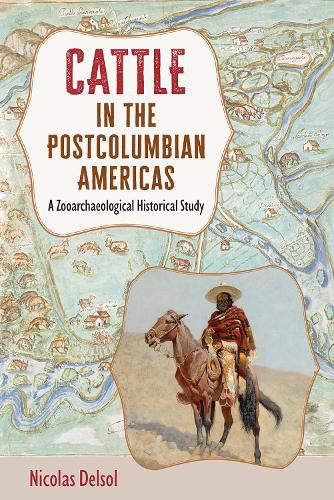Readings Newsletter
Become a Readings Member to make your shopping experience even easier.
Sign in or sign up for free!
You’re not far away from qualifying for FREE standard shipping within Australia
You’ve qualified for FREE standard shipping within Australia
The cart is loading…






This title is printed to order. This book may have been self-published. If so, we cannot guarantee the quality of the content. In the main most books will have gone through the editing process however some may not. We therefore suggest that you be aware of this before ordering this book. If in doubt check either the author or publisher’s details as we are unable to accept any returns unless they are faulty. Please contact us if you have any questions.
How the arrival of cattle transformed life and society in the Americas
In this book, Nicolas Delsol compares zooarchaeological and material evidence from sites across Mesoamerica and the Caribbean to show how the introduction of cattle, beginning with imports by Spanish colonizers in the 1500s, shaped colonial American society.
Before European colonization, cows were vital in European and African societies but were unknown to the Native communities of the Western Hemisphere. This book traces their impact in the Americas by using a broad range of methods, such as ancient DNA analyses on faunal collections from major postcolumbian sites. Delsol describes the place of cattle in the colonial culture and landscape, beginning with the transportation of cattle across the Atlantic and moving to herding practices in new habitats, butchery techniques, and the production, trading, and use of cow byproducts.
Cattle in the Postcolumbian Americas is the first large-scale regional archaeological study of the introduction of a European domesticated species to the Americas. Using both zooarchaeological and historical data, Delsol argues that the arrival of cattle was a major consequence of European colonization with effects that have often been overlooked.
$9.00 standard shipping within Australia
FREE standard shipping within Australia for orders over $100.00
Express & International shipping calculated at checkout
This title is printed to order. This book may have been self-published. If so, we cannot guarantee the quality of the content. In the main most books will have gone through the editing process however some may not. We therefore suggest that you be aware of this before ordering this book. If in doubt check either the author or publisher’s details as we are unable to accept any returns unless they are faulty. Please contact us if you have any questions.
How the arrival of cattle transformed life and society in the Americas
In this book, Nicolas Delsol compares zooarchaeological and material evidence from sites across Mesoamerica and the Caribbean to show how the introduction of cattle, beginning with imports by Spanish colonizers in the 1500s, shaped colonial American society.
Before European colonization, cows were vital in European and African societies but were unknown to the Native communities of the Western Hemisphere. This book traces their impact in the Americas by using a broad range of methods, such as ancient DNA analyses on faunal collections from major postcolumbian sites. Delsol describes the place of cattle in the colonial culture and landscape, beginning with the transportation of cattle across the Atlantic and moving to herding practices in new habitats, butchery techniques, and the production, trading, and use of cow byproducts.
Cattle in the Postcolumbian Americas is the first large-scale regional archaeological study of the introduction of a European domesticated species to the Americas. Using both zooarchaeological and historical data, Delsol argues that the arrival of cattle was a major consequence of European colonization with effects that have often been overlooked.